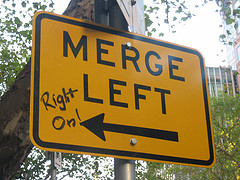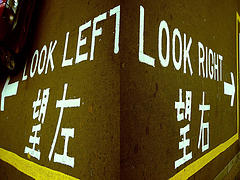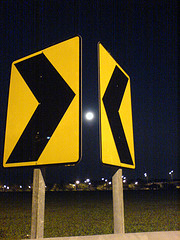Honton ko si kar dekhiye pachtaiye ga aap
Hangame jaag uthte hain aksar ghuttan ke baad
 Any anodyne effect this sher might have had on me was lost forever when my neo-Trotskyite friend decided to give me his interpretation of it. I didn’t ask for it, but there it was. A multi-headed hydra called “having coffee†– where the conversation starts off polite, turns to prittle-prattle , turns to poetry, turns to politics, turns to polemics, turns to punches. Lucky for me, he hits like a girl.
Any anodyne effect this sher might have had on me was lost forever when my neo-Trotskyite friend decided to give me his interpretation of it. I didn’t ask for it, but there it was. A multi-headed hydra called “having coffee†– where the conversation starts off polite, turns to prittle-prattle , turns to poetry, turns to politics, turns to polemics, turns to punches. Lucky for me, he hits like a girl.
“Religious extremism is the new communism,â€
he hissed, spraying spittle in all directions. I laughed. He carried on, unperturbed but passionate:
“The poor man has found his outlet – the injustice, the exploitation, the degradation, the desperation he’s suffered has found its expression. Islam, like communism, is based on egalitarian principles and promises them justice and equality. You think religious extremism has got anything to do with religion? It is nothing but the collective voice of a people who’ve been wronged their whole lives.â€
Somehow this gave me goose bumps and I quickly gulped down the latte in hope of thawing the chill his words left. It didn’t work and I got to thinking about Pakistan and Pakistanis everywhere.
Religious extremists in Pakistan can come from all walks of life but a sizeable chunk belongs to the poorer section of the society. Pakistani immigrants and expatriates living in the West also make up a significant portion. Why are these two groups more prone to religious extremism and terrorism? Was it that, time and again, they were discriminated against and shunted to silence? Did the exclusion leave such bitterness that it got bottled up inside for so long – so long that it is now, quite literally, exploding?
 In Pakistan’s context, the implication that religious extremism is connected to poverty and disfranchisement has been made not with a bang but a whimper (pun unintended). I think this concept needs to be forced to the fore. Many in the corridors of power are finding it convenient to ignore the ‘real’ reasons leading to Islamic radicalism, as that may point the j’accuse finger in their direction. But let’s briefly look at why a 19 year old Pakistani boy picks up a Kalashnikov or why a 37 year old father of three straps explosives around his waist.
In Pakistan’s context, the implication that religious extremism is connected to poverty and disfranchisement has been made not with a bang but a whimper (pun unintended). I think this concept needs to be forced to the fore. Many in the corridors of power are finding it convenient to ignore the ‘real’ reasons leading to Islamic radicalism, as that may point the j’accuse finger in their direction. But let’s briefly look at why a 19 year old Pakistani boy picks up a Kalashnikov or why a 37 year old father of three straps explosives around his waist.
It’s no secret that democratic institutions in Pakistan are in a frail state, if at all alive.
And then there is no Left or not much left of it. (The Communist Party of India could arguably be a good example of the importance of such a “balance of power†– on the domestic front at least.) In Pakistan very few avenues are open to the poor in need of some succour or just in need of voicing their distress. So, what happens? Under a dictatorship, and with no diversity of political parties to choose from, the poor, frustrated man turns to the radical Right – the Mullahs and their might.
Pakistani religious extremists living in the West dance to a slightly different tune. Feeling discriminated, displaced, alienated or plain confused – they crave to cling to a core, something that will anchor their sense of identity. Often times this comes in the form of religion. Sometimes its taken to an extreme. So, the religious radical turns to radicalism not out of a love for religion, but a deep hatred for those elements that he felt were unjust towards him (or his brethren.) Anti-Western sentiments do not transpire from Koranic verses, instead they’re born of the experiences one had in/of the West and the bitter taste that can leave in one’s mouth… body and soul.
 This is important. Scholars like Nichole Argo have accentuated the point: emotional and social ties precede the acquisition of ideology. Either our social situation has to be in the doldrums or our emotional condition so wounded that we take a religious ideology to an extreme. The media almost always portrays the religious extremist or terrorist as a gun-slinging gung-ho Islamist with a medieval mind and beard to boot. He is a dangerous, diehard jihadi on a mission to kill or be martyred trying. Such a description is like a donut-truth; the truth, the whole truth, with a hole in the truth (I forget what film this line is from). That hole is the real reasons people are pushed to accept a radicalised Islam, and these reason need to be better understood if we sincerely hope to curb extremism. Half-measures – like madrassa reformation – being implemented by our marginal-satisfiers might prove productive in that they’re broadening the narrow teachings of many religious seminaries. But they’re not preventing extremism. People, especially the poor and alienated, will continue to feel helpless in the face of a system they despise but can’t do anything to change. In fact, they may feel, and most do, that the measures being taken to tackle extremism are the spawn of the West, the very demon they wish to slay. So, they will continue feeling dejected and cheated. This inadvertently leads to the shift in their psyche that paves way for an extremist view.
This is important. Scholars like Nichole Argo have accentuated the point: emotional and social ties precede the acquisition of ideology. Either our social situation has to be in the doldrums or our emotional condition so wounded that we take a religious ideology to an extreme. The media almost always portrays the religious extremist or terrorist as a gun-slinging gung-ho Islamist with a medieval mind and beard to boot. He is a dangerous, diehard jihadi on a mission to kill or be martyred trying. Such a description is like a donut-truth; the truth, the whole truth, with a hole in the truth (I forget what film this line is from). That hole is the real reasons people are pushed to accept a radicalised Islam, and these reason need to be better understood if we sincerely hope to curb extremism. Half-measures – like madrassa reformation – being implemented by our marginal-satisfiers might prove productive in that they’re broadening the narrow teachings of many religious seminaries. But they’re not preventing extremism. People, especially the poor and alienated, will continue to feel helpless in the face of a system they despise but can’t do anything to change. In fact, they may feel, and most do, that the measures being taken to tackle extremism are the spawn of the West, the very demon they wish to slay. So, they will continue feeling dejected and cheated. This inadvertently leads to the shift in their psyche that paves way for an extremist view.
Some extremists may genuinely be harbouring a twisted interpretation of religion, and others may just be twisted by nature. But I believe that for most the acquisition of a radical religious ideology is triggered from a more fundamental feeling of victimisation, of feeling wronged, and/or being part of a harshly unjust system. In such cases religion offers unction, and a bandwagon-effect ensues whereby millions of disempowered and discriminated find a mouthpiece and meaning in the Right. Ironically, the factors thrusting them to the extreme right is born of leftist logic; an anti-establishment egalitarian cry for equal rights for the common citizen.
(How corrupt leaders exploit this feeling in the masses to further their own political interests is another matter. Also I would like to advise everyone to not turn this into a debate about Islam. It is about how the basic wrongs in society which cause an individual to adopt an extremist view, and how it is these wrongs that need to be focused if we wish to break free from the vicious cycle of militancy and dictatorship.)
Photo Credits: Flickr.com



















































I know you would be hating tht I am poking but you are keep giving loose ball to play around. :-)
Believing and practicing religion is one thing; and propagating a particular sectarian
Done by every sect. Barelvis have the biggest center near Sabzi Mandi Karachi. I rather see Green Turban guys and Barelvis more in action than anyone else.
By your logic, we should ban shias to come out and beating their chests in the name of Hussain(RA). Similarly Sind govt should pass a law that no Bohri display its religious association publicly by wearing cap on head.
anything that does not align with your worldview is
Ibrahim
“Is following the practices of Islam and preaching equals extremism in your dictionary?”
No not at all. You have obviously misconstrued in your zeal to trash my comment :). Believing and practising religion is one thing; and propagating a particular sectarian (deobandi inspiration in most cases here) belief in the public domain is another – I can continue but this will be an endless polemic that I do not wish to enter. I think you have made your point rather agressively above. And, I have made my point too.
What worries me is however this sort of remark:
“This comment of Raza Rumi should be brought up again and again whenever he writes a post related to Islam because it depicts a very dangerous and ignorant mentality. This is exactly the mentality that makes every post of his with reference to Islam suspect.”
anything that does not align with your worldview is ‘suspect’? Is it not a form of moral policing while Islam clearly mentions that only Allah has that role as He is the ultimate Judge of our beliefs and conduct?
And, any dissenting ‘mentality’ of course needs a certification from a chosen select few – otherwise it becomes ‘dangerous’ and ‘ignorant’…?
So what is next: a fatwa??…..
Sorry Raza but the points you made still coudn’t justify why you called tableeghis or huda guys “extremist”. On other hand you didn’t answer me whether agha khanis and bohris are extremist or not? or its just you attack on those who don’t belong to your sect of Islam? Do answer me here or anywhere you want but don’t play with words.
Ms. Shaam: Sorry to say
Qandeel:
Many thanks for your detailed response and also sympathising as I was ‘lambasted’ here – :)
Well, I wanted to debunk the popular theory -now almost a mediatised truth that poverty led to extremism. Darlymple’s interesting article (published in New Statesman) on madrasas cited Marc Sageman’s “Understanding Terror Networks”. Sageman analysed the lives of 172 al-Qaeda-linked terrorists: two-thirds were middle class and university-educated; technically minded professionals and several have PhDs. Their average age was 26, most were married, and many had children. Only two showed signs of psychosis. As WD wrote: “It seems that Islamic terrorism, like its Christian predecessor, remains a largely bourgeois endeavour”.
Quoting Sageman again: “These are truly global citizens,” familiar with many countries – the west as well as the Middle East – and able to speak several languages with equal facility . . . Even their ideologues are not trained clerics: [Sayyid] Qutb [for example] was a journalist.”
Another quote from Darlymple is worth considering:
“The men who planned and carried out the Islamist attacks on America – all but four of them were Saudi citizens – have often been depicted in the press as being “medieval fanatics”. In fact, it would be more accurate to describe them as confused but highly educated middle-class professionals: Mohammed Atta was an architect and a town-planning expert; Ayman al-Zawahiri, Bin Laden’s chief of staff, was a paediatric surgeon; Ziad Jarrah, one of the founders of the Hamburg cell, was a dental student who later turned to aircraft engineering; while Omar Sheikh, the kidnapper of the Wall Street Journal reporter Daniel Pearl, had studied at the LSE and was the product of the same British public school that produced the film-maker Peter Greenaway.”
I am a little amazed that you will not count Lal Masjid in the category despite the public declarations of ‘blowing’ themselves and the arsenal of arms and ammunition found there. Regardless, of who nurtured them and how that tragedy was handled, this group represented the militant face of Islamism. This is what was recovered from there:
” Russian made RPG and Chinese variant RPG-7 rockets. Anti-tank and anti-personnel landmines, suicide bombing belts, three to five .22 caliber rifles, RPD and RPK-74 light machine guns, Dragunov sniper rifles, SKS rifles, pistols, night vision equipment, and over 50,000 rounds of different caliber ammunition. Three crates of petrol bombs prepared from green soft drinking bottles, gas masks, recoilless rifles, dozens of AK-47s, two-way radios, large plastic buckets held tennis-ball-size homemade bombs and knives….”; and the list goes on.
Extremism as one definition (narrow and dictionary oriented) is “advocacy of extreme measures or views” and perhaps militancy would be implementation of such measures in the physical sense. However, spread of extremism requires a singular view of the world with no room for dissent.
And this is why the spread of particular brands of “Islam” provides a breeding ground for the acceptance of extremist measures. When Al-Huda starts converting hunderds and thousands of women to Saudi style hijab (that is not required by Allah at the time of Hajj – note the obvious irony) and one version fits all, then you have a society where man-made constructs of religion prevail.
Please note a well cited position of Al-Huda that is in conflict with the laws of the land (i.e. Muslim Family Law Ordinance): women to encourage their husbands to marry again to take care of the other sisters! There are some positive aspects of Al-Huda that have been noted but in general it is a bourgeois endeavour that prepares increasing acceptance of extremism. Critics have also noted that its literature is available in the offices of controversial organizations like the Jamat-ud-Dawa!
It is in this context, the whole glorification of Lal Masjid, negotiations being conduced by the media anchor men represented a dangerous trend that sympathisers of ‘extreme’ behaviour who could easily dispense with flouting law in the name of religion. And, now of course, they have been subjected to the same treatment – flouting of the law and the Constitution once again. The Urdu press and media thus become ‘soft’ vehicles for promoting the extreme versions such as man-made Hadood laws where some journalists mentioned even discussing their review as blasphemy.
And the tableeghi jamaat: of course they are benign but the problem is that they preach an Islam that is silent on most of the ‘external’ matters chiefly among these is militancy, women’s treatment in the name of Islam. So when you have a brand that does not focus on Haqooq ul Ibaad in the same measure, you essentially prepare millions to be silent observers (and often sympathisers) of all the mess caused by political Islam.
I have been accosted many a time by the brigade and my point to them always has been: if you condemn sectarianism, suicide bombings and crimes against women then I will join you – and I was often chided as being ‘gumraah’ who needed more “hidayat”.
(judging by comments made by Adnan and Ibrahim, probably they are right :) -)
Islam’s prime focus on social justice, of a progressive, dynamic society gets lost in this maze of ritualized and now increasingly political Islamist worldview that is inward looking and not hesitant to preach violence.
Coming back to your post, if poverty were an issue then 50% of Karachi’s population lives in squatter settlements and the religious parties have been traditionally active there. However after the rise of MQM, the poor and marginalized continue to look for progress in mainstream parties extremist fringe and their seminaries notwithstanding.